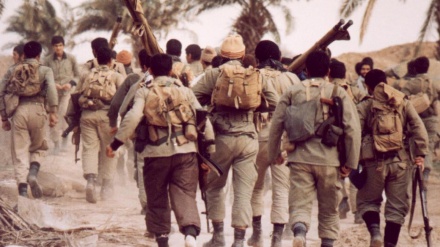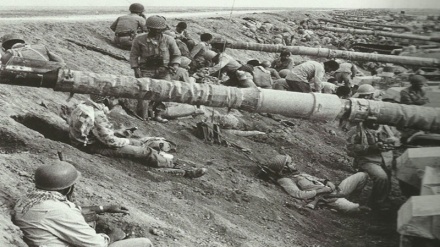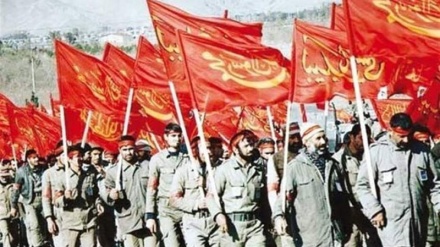Glimpses of Epic of the 8-Year Holy Defense (80)
Today we are going to discuss the consequences of retaking the port city of Faw by Saddam three months before accepting the UN Security Council Resolution 598 in 1988. The two outstanding features of the fall of Faw were “the change in balance” and “disturbance of psychological equation” in the war. The emergence of this situation as a turning point strengthened the mentality that the time was ripe for ending the war.
The retaking if Faw by Saddam’s army with the direct US support changed the balance to the favour of Saddam. The new conditions emboldened the Ba’athist army to put the capture of Shalamcheh in the East of Basra on the agenda. Three divisions of the Iraqi army, with scores of infantry and armoured battalions, quickly managed to break the Iranian defensive lines in Shalamcheh. Prior to this, Iran’s upper hand was always emphasized. Iran’s aggressive power, the high spirit of its forces in consecutive attacks to Iraq and liberating some parts of Iraq, and the vastness of Iran’s soil were among the factors giving Iran the upper hand in the war. However, as soon as the Iraqi war machine changed its position from defensive to offensive, the course of the war altered to the favour of Iraq and the superiority of Iraq was considered among pundits.
The most important issue that was raised among the news media and military analysts was the termination of war. Meanwhile, the victories of the Ba’athist army were evaluated as the real chance for ending the war. The fall of Faw caused the Islamic Republic of Iran to take certain measures. The first was to increase diplomatic moves and serious pursuit of certain changes in the articles of the UNSC Resolution 598. The second measure was to invite the people to support the warfronts. Imam Khomeini in a message on the occasion of the formation of the third Majlis (Parliament), said to the Iranian nation, “Dear people of Iran, after finishing the election, like before, continue your material and spiritual backing for the battlefronts and combatants and support the troops of light.” Elsewhere in his message, the Imam Said, “For the great nation there is no victory higher than the determination, resolve and will to reach the right which, thank God, He has granted the Iranian people.”
The next step of the Iraqi army was to capture the Majnoon Islands after Iran’s retreat from Shalamcheh. The assault to Majnoon was the climax of the Iraqi power. Iraq attacked the region in the best way as it had made progress tactically. The criminal Iraqi army gassed the frontlines and the backlines in the Islands in a bid to take captives. The new situation was not pleasant for Iran. On the one hand, the fall of the captured regions inside the Iraqi soil would deprive Iran of pressuring the UN; and on the other hand, it couldn’t continue the war against the attacks of the Iraqi army. As a result, the Supreme Council of War issued a new statement, whereby it explained the war conditions and announced new decisions for containment of economic problems and recruitment of forces.
The Great Satan (the US), in a bid to impose its demands on Iran, shot down an Iranian passenger plane on the Persian Gulf and martyred all of the 290 passengers and crew. The plane was flying from Bandar Abbas to Dubai. This criminal act had broad consequence as a human tragedy. The United States was aware of its move. Thus, in the first reaction to the negative repercussions in the public opinion, claimed that the plane was a military plane intending to invade the American warship. Washington also claimed that the Iranian plane had not paid attention to the warnings of the American warship; hence it was targeted and shot down. But, after being disclosed that there was no other plane in the air except the Iranian Airbus at that moment, the Americans claimed that their move was totally defensive. In view of this, the Chief of Staff of the American Army said that the US warships had defended themselves.
The American leaders wanted to prevent the vehement wave of public opinion against them on the one hand; and intended to make the Iranian side, on the other hand, that Washington would not resort to every criminal measure to take the initiative in the war. Therefore, then US criminal president Ronald Reagan described the measure as a decent one and even warded the commander of the Vincennes warship before the cameras. Yet, the United Nations, as usual, didn’t show a proper reaction to this criminal and antihuman act of the US regime. Moreover, it appeared that Iran had changed its foreign policy and didn’t intend to take any retaliatory measure against the US. Iran called for the immediate holding of the UN Security Council session and the Iranian mission at the UN announced, “The UNSC should very soon examine the massacre that will be followed by other terrorist measures.”
The Iranian officials, preventing to take any retaliatory measure against the US criminal act, intended to pave the ground for ending the war through recognition of the aggressor and initiator of war.
RM/SS


